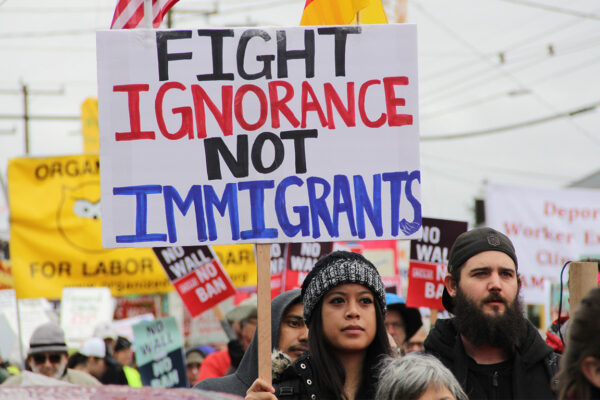Being the daughter of two Haitian immigrants shapes not only how I move through the world, but how I come to this work as an immigration advocate. The choice my family made to come to this country charted the course of my future, because they saw the potential in America. They saw value in a country that was willing to give them an opportunity to start over. Like many immigrants, my family worked hard, studied harder, and built a foundation for me to be able to thrive in their new home. But we aren’t living in the US of late 1960s, where my grandmother chose to raise her children. In the last 30 years, our immigration system has undergone a shift that codifies bias and xenophobia, in the name of security and safety.
With the creation of the mega department, the Department of Homeland Security (DHS), immigration enforcement has its tentacles in all things. The need to protect the “homeland” has come right up against the bedrock of our contemporary immigration system, family reunification. Our story as Haitian Americans is rooted in family, with the majority of Haitian immigrants arriving to the US with a family member sponsoring them for a green card or vouching for them to receive a tourist visa. The rapid ability to sponsor a sibling, child, parent or spouse is what differentiates us from Canada and Western European models of migration policy. However, with each successive immigration policy change, adjudication manual revision or executive order, anti-immigrant advocates chip away at our family immigration system. For example, the recent public charge rule most impacts immigrants who are currently in the US, awaiting final adjudication of their conditional residence for their green card. The current expansion of the benefits deemed relevant for a public charge evaluation include food, housing, and medical assistance. With thousands of Haitian Temporary Protected Status (TPS) holders eligible for or awaiting their family petition, the new ruling puts their pathway to a permanent status in jeopardy. Not only is this public charge rule a threat to family-based immigration, it solidifies the argument that only wealthy “self-sufficient” immigrants are deserving of entrance or residence in this country.
Since the Immigration and Nationality Act of 1965 abolished the racist National Origins Formula quota system, each successive wave of immigrants has become browner and blacker as those from the Caribbean and Latin America were no longer excluded from emigrating to the US in large numbers. In 1966, my grandmother, like many Haitians, took advantage of this reform, which established our family-based immigration system’s focus on reunited immigrant families and attracting skilled labor of all kinds. For example, Haitians were able to get green cards based on their skills as mechanics, dressmakers, and students. As a result, Haitian Americans have become pivotal to South Florida’s culture, economy, and society. We are entrepreneurs, artists, cooks, doctors, taxi drivers, teachers, religious and community leaders.
While previous generations of immigrants did not have to pass a wealth test, the 1990s brought new policies that focused on high-skill labor, the criminalization of immigrants, and bars to accessing the social safety net programs. Our over-criminalization of immigrants is the lasting legacy of the Illegal Immigration Reform and Immigrant Responsibility Act of 1996, which made more people deportable and made it easier to deport permanent residents, particularly black immigrants from the Caribbean. Since 1996, we have seen a dramatic increase in detention at places like the infamous Krome Detention Center, increases in workplace raids, and xenophobic policies regarding who is worthy of full rights and liberties in the US.
As we sit in this moment during the global COVID-19 pandemic, we are operating under an immigration system that is criminalizing immigrant residents of our county for accessing benefits and services that can protect their families. There are Haitian American families, which are not monolithically single-status families, who are currently excluded from CARES Act relief checks. Moreover, given the current culture of fear, many immigrants are unsure of whether or not they can even apply for their unemployment benefits or get the food assistance they need to feed their families. And yet, at the same time, Haitians are serving as essential workers in our hospitals, supermarkets, and other public services. So I ask, this Haitian Heritage Month, that we honor our talent, sacrifice, and entrepreneurial spirit that is in the very DNA of Miami and that we continue to fight for our vision of America.
Krystina François is executive director of the Office of New Americans of Miami-Dade.

